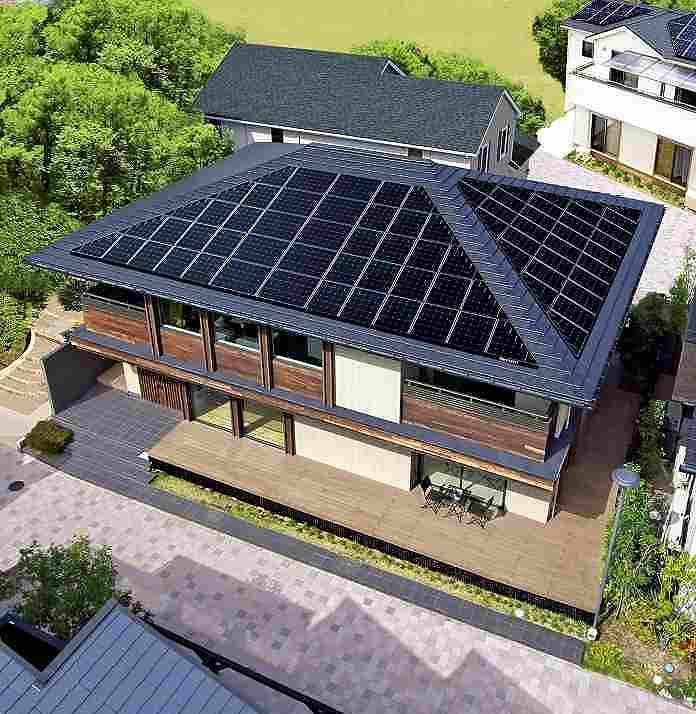
A house with solar panels installed on the roof
14:30 JST, September 5, 2021
Solar panels may soon become a common fixture in neighborhoods across the nation, as an increasing number of companies offer to install solar energy systems atop new single-family residences for free. By removing the initial sticker shock to setting up photovoltaic rigs — upfront costs typically run ¥1 million or more — companies hope the move will encourage more homeowners to tap into solar power, although monthly usage fees may still apply.
Sumitomo Realty & Development Co. and TEPCO Energy Partner Inc. announced Thursday that they will install solar panels and storage batteries for free in new detached homes, with free repairs in the event a panel breaks or malfunctions. The companies plan to recoup the costs of the scheme by charging homeowners monthly usage or other fees.
Currently, about one-fourth of Sumitomo’s newly built residences have solar panels — a number the company hopes to nearly double.
Companies have also eyed offsetting costs through certificates that can be issued for solar power generation, verifying that zero carbon dioxide emissions were produced in the electricity generation process. These certificates can be sold and the income used to pay for panels.
These certificates allow holders to qualify for renewable energy designations even when using electricity generated by thermal power, sparking interest among companies looking to reduce their carbon footprint.
In June, a subsidiary of Sharp Corp. that handles solar power systems teamed up with a startup in the retail electricity sector to offer the free installation of Sharp panels in new homes in parts of Honshu and Kyushu.
Homeowners can use all the solar electricity they want, for a flat rate ranging between ¥7,700 to ¥9,900 per month. Under the deal, additional energy costs are waived at night and other idle times when solar power is not being generated, up to 140 kilowatt hours per month.
Kyocera Corp., a major panel maker, and Kansai Electric Power Co. formed a joint venture in 2019 that has also launched a free installation initiative.
According to the Japan Photovoltaic Energy Association, solar panel units were installed at 420,000 houses in fiscal 2012 when the feed-in tariff system was introduced, though from fiscal 2015 to 2020, growth slowed to around 150,000 houses per year.
Apart from factors associated with changes to the system, high installation costs have been a major barrier. Eliminating upfront costs reduces the burden on homeowners, while also expanding sales avenues for manufacturers and helping them secure customers.
The government has also been supportive of the installation of solar panels.
Starting this fiscal year, the Environment Ministry has launched a system to subsidize construction and other costs for businesses that install solar panels for free.
A draft of the government’s basic energy plan released this summer includes a policy of raising renewable energy’s slice of the total power generation pie from the current 18% to 36-38% by fiscal 2030.
Top Articles in Business
-

Prudential Life Insurance Plans to Fully Compensate for Damages Caused by Fraudulent Actions Without Waiting for Third-Party Committee Review
-

Narita Airport, Startup in Japan Demonstrate Machine to Compress Clothes for Tourists to Prevent People from Abandoning Suitcases
-

Japan, U.S. Name 3 Inaugural Investment Projects; Reached Agreement After Considerable Difficulty
-

JR Tokai, Shizuoka Pref. Agree on Water Resources for Maglev Train Construction
-

Toyota Motor Group Firm to Sell Clean Energy Greenhouses for Strawberries
JN ACCESS RANKING
-

Japan PM Takaichi’s Cabinet Resigns en Masse
-

Japan Institute to Use Domestic Commercial Optical Lattice Clock to Set Japan Standard Time
-

Israeli Ambassador to Japan Speaks about Japan’s Role in the Reconstruction of Gaza
-

Man Infected with Measles Reportedly Dined at Restaurant in Tokyo Station
-

Videos Plagiarized, Reposted with False Subtitles Claiming ‘Ryukyu Belongs to China’; Anti-China False Information Also Posted in Japan





















